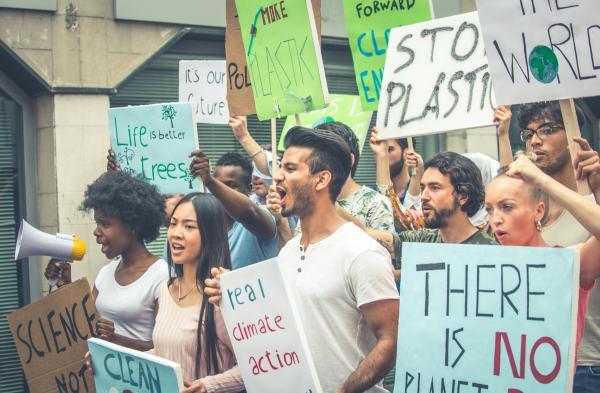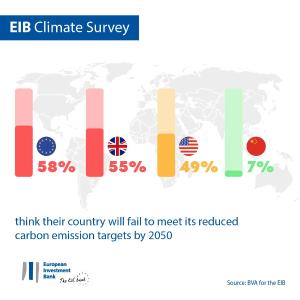
The first release of the 2021-2022 EIB Climate Survey explores people’s views on climate change in a rapidly changing world. The results from this release focus on citizens’ perceptions of climate change and the actions they expect their country to take to combat it.
- 82% of Spanish people say that climate change is the biggest challenge facing society in the 21st century
- 81% feel that climate change has an impact on their everyday lives (+5 points vs. last year)
- 83% believe they are more concerned about the climate emergency than their government
- 81% of Spanish people say they are in favour of stricter measures imposing changes on people’s behaviour
- 58% think that their country will fail to drastically reduce its carbon emissions by 2050
- 89% say they want to replace short-distance flights by fast, low-polluting trains in collaboration with neighbouring countries
- 70% would welcome a tax on products and services that contribute most to global warming
Climate change and its consequences are seen as the biggest challenges for humanity in the 21st century (82%). This figure is greater than 73% across all age groups and political leanings of the Spanish population.
Most people in Spain (81%) feel that climate change has an impact on their everyday lives, which is a 5-point increase compared to last year (76%). This figure is also four points higher than among Europeans in general (77%).
These are some of the results from the first part of the 2021-2022 Climate Survey published today by the European Investment Bank (EIB). The EIB is the lending arm of the European Union and the world’s largest multilateral lender for climate action projects.
Spanish people sceptical of their government’s ability to fight climate change
The vast majority of Spanish people (83%) believe that they are more concerned about the climate emergency than their own government (eight points higher than the European average of 75%). They say the measures in place are too flexible and allow individuals and businesses to avoid changing their behaviour and practices. 58% of Spanish citizens therefore believe that Spain will not succeed in drastically reducing its carbon emissions by 2050, as pledged in the Paris Agreements.
Consequently, 81% are in favour of stricter government measures to impose changes on people’s behaviour, similar to the measures put in place during the COVID-19 crisis. This figure is two points higher compared to last year, and 11 points above the European average (70%).
The energy debate
A significant majority of Spanish people think that their country should rely more on renewable energies (76%) to tackle the climate crisis, a figure that is 13 points higher than the European average (63%). Spanish people with left-leaning political views support renewables much more strongly than those with right-leaning political views (85% compared to 65%), a difference of 20 points.
Spanish respondents rank nuclear energy (9%, three points below the European average of 12%) and natural gas (4%, two points below the European average) far below renewables as the energy source to be developed further to address climate change.
10% of Spanish people (7% of men and 13% of women) would prioritise energy savings before developing other energy sources to tackle the climate crisis.
Most popular solutions to fight climate change among Spanish people
Spanish respondents would welcome several proposals to accelerate the fight against climate change. 95% are in favour of strengthening education and increasing children’s awareness of sustainable consumption.
94% support imposing a warranty of a minimum of 5 years on any electric or electronic product and 89% state they want to replace short-distance flights by fast, low-polluting trains in collaboration with neighbouring countries. Three-quarters of Spanish people (75%) would welcome a tax on products and services that contribute most to global warming. Even 73% of respondents whose level of income classifies them as low-income earners would be in favour of such a tax.
“89% of Spanish respondents say they want to replace short-distance flights by fast trains. This is one of the main priorities of the EIB across Europe. In Spain, we provided €890 million to Adif Alta Velocidad to finance the high-speed rail line connecting Madrid and Extremadura, used by more than 2.6 million passengers a year. We must work together, crowd in resources from the private sector and invest in new disruptive technologies to achieve the climate goals we have set,” said EIB Vice-President Ricardo Mourinho Félix.
Download the Excel spreadsheet with the raw data for all 30 countries surveyed here. Please click here to access the EIB website page that presents key findings of the EIB Climate Survey IV.
About the EIB Climate Survey
The European Investment Bank has launched the fourth edition of the EIB Climate Survey, a thorough assessment of how people feel about climate change. Conducted in partnership with market research firm BVA, the fourth edition of the EIB Climate Survey aims to inform the broader debate on attitudes and expectations in terms of climate action. More than 30 000 respondents participated in the survey between 26 August and 22 September 2021, with a representative panel for each of the 30 countries polled.
About the European Investment Bank
The European Investment Bank is active in around 160 countries and is one of the world’s largest multilateral lenders for climate action projects. The EIB Group has recently adopted its Climate Bank Roadmap to deliver on its ambitious agenda to support €1 trillion of climate action and environmental sustainability investments in the decade to 2030 and to deliver more than 50% of EIB finance for climate action and environmental sustainability by 2025. As part of the Roadmap, all new EIB Group operations have also been aligned with the goals and principles of the Paris Agreement since the start of 2021.
About BVA
BVA is an opinion research and consulting firm recognised as one of the most innovative market research firms in its sector. Specialised in behavioural marketing, BVA combines data science and social science to make data inspiring and bring it to life. BVA is also a member of the Worldwide Independent Network of Market Research (WIN), a global network of some of the world’s leading market research and survey players, with over 40 members.

Photographer: EIB ©EIB
Download original

Photographer: EIB ©EIB
Download original

Photographer: EIB ©EIB
Download original

Photographer: EIB ©EIB
Download original

Photographer: EIB ©EIB
Download original